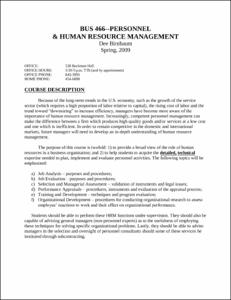Please use this identifier to cite or link to this item:
http://hdl.handle.net/10267/3683Full metadata record
| DC Field | Value | Language |
|---|---|---|
| dc.contributor.author | Birnbaum, Dee | - |
| dc.date.accessioned | 2009-04-06T18:27:57Z | - |
| dc.date.available | 2009-04-06T18:27:57Z | - |
| dc.date.issued | 2009-01-14 | - |
| dc.identifier.uri | http://hdl.handle.net/10267/3683 | - |
| dc.description | This syllabus was submitted to the Rhodes College Office of Academic Affairs by the course instructor. | en_US |
| dc.description.abstract | Because of the long-term trends in the U.S. economy, such as the growth of the service sector (which requires a high proportion of labor relative to capital), the rising cost of labor and the trend toward “downsizing” to increase efficiency, managers have become more aware of the importance of human resource management. Increasingly, competent personnel management can make the difference between a firm which produces high quality goods and/or services at a low cost and one which is inefficient. In order to remain competitive in the domestic and international markets, future managers will need to develop an in-depth understanding of human resource management. The purpose of this course is twofold: 1) to provide a broad view of the role of human resources in a business organization; and 2) to help students to acquire the detailed, technical expertise needed to plan, implement and evaluate personnel activities. The following topics will be emphasized: a) Job Analysis – purposes and procedures; b) Job Evaluation – purposes and procedures; c) Selection and Managerial Assessment – validation of instruments and legal issues; d) Performance Appraisals – procedures, instruments and evaluation of the appraisal process; e) Training and Development – techniques and program evaluation; f) Organizational Development – procedures for conducting organizational research to assess employee’ reactions to work and their effect on organizational performance. Students should be able to perform these HRM functions under supervision. They should also be capable of advising general managers (non-personnel experts) as to the usefulness of employing these techniques for solving specific organizational problems. Lastly, they should be able to advise managers in the selection and oversight of personnel consultants should some of these services be instituted through subcontracting. | en_US |
| dc.language.iso | en_US | en_US |
| dc.publisher | Memphis, Tenn. : Rhodes College | en_US |
| dc.relation.ispartofseries | CRN Syllabi | - |
| dc.relation.ispartofseries | 29706 | - |
| dc.rights | Rhodes College owns the rights to the archival digital objects in this collection. Objects are made available for educational use only and may not be used for any non-educational or commercial purpose. Approved educational uses include private research and scholarship, teaching, and student projects. For additional information please contact archives@rhodes.edu. Fees may apply. | - |
| dc.subject | Syllabus | en_US |
| dc.subject | Text | en_US |
| dc.subject | Curriculum | en_US |
| dc.subject | Business Administration | en_US |
| dc.subject | 2009 Spring | en_US |
| dc.title | BADM 466-01, Personal & Human Resource Management, Spring 2009 | en_US |
| dc.type | Syllabus | en_US |
| Appears in Collections: | Course Syllabi | |
Files in This Item:
| File | Description | Size | Format | |
|---|---|---|---|---|
| 2009_spring_Business_466-01_29706.pdf | 66.09 kB | Adobe PDF |  View/Open |
Items in DSpace are protected by copyright, with all rights reserved, unless otherwise indicated.